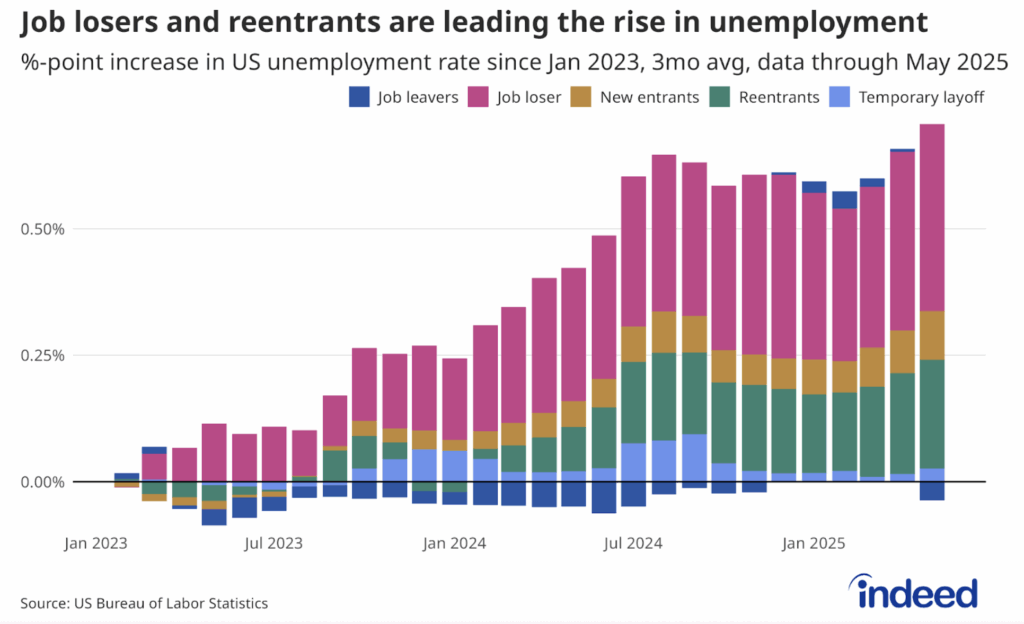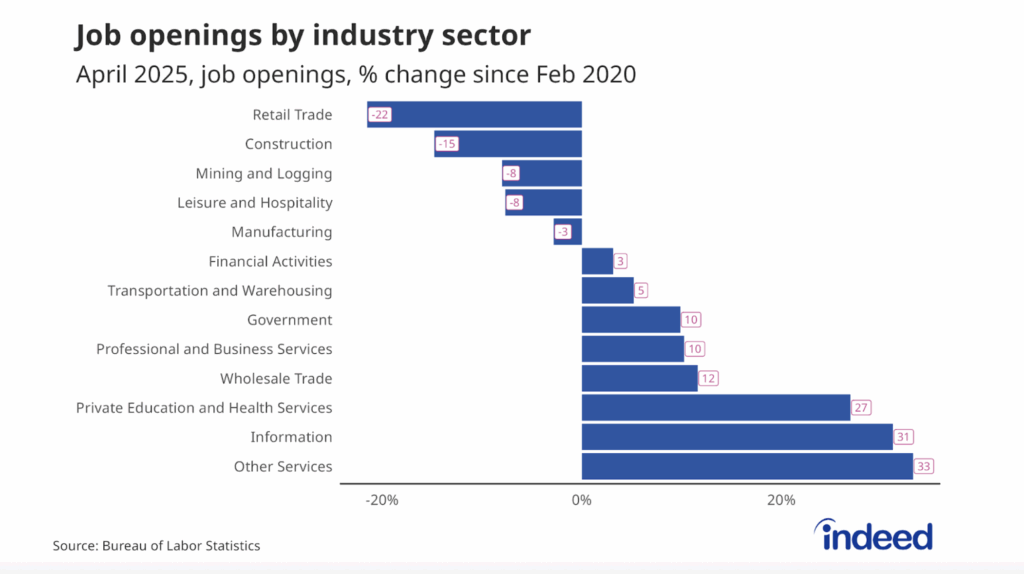Where are the job seekers? You can’t open a newspaper without seeing a story about employers having trouble finding workers and difficulty hiring. Some states have decided that government benefits are holding workers back and are therefore prematurely opting out of enhanced federal unemployment insurance. A disappointing jobs report in April fueled these worries and heightened the arguments.
Labor market data suggest that pandemic factors still hold job seekers back, making hiring more difficult. Employers clearly want to hire: job postings on our site are climbing in nearly all sectors and regions of the country. The latest government data showed that job openings are growing faster than hires.
Furthermore, wage growth is higher than you’d expect in an economy coming out of a recession where unemployment is still elevated. Wages rose 3% in March versus a year ago, which is pretty close to the wage gains when the labor market was tight just before the pandemic. And the “reservation wage” — the salary that job-seekers need to accept a job — rose dramatically during the pandemic for adults without a college degree.
The combination of lots of openings, surprisingly strong wage growth, and slower-than-expected hiring all point to strong labor demand from employers bumping up against iffy labor supply from job seekers.
Why don’t employers just raise wages more? Many are! But businesses have suffered in this pandemic, too, and some can’t afford to raise wages. Also, if this labor crunch is temporary then businesses might rather offer a temporary bonus to get them through this period rather than a wage increase, which is hard to undo later on.
What’s holding job seekers back?
There are many plausible reasons why job seekers aren’t more eager or able to work. Some have been in play since the start of the pandemic, while others have arisen only in recent months. Nearly all are unique to this pandemic and help explain why this recession and recovery are different from previous ones.
Reasons from the start of the pandemic
- Temporary unemployment. One way that the pandemic recession was most different from all other recessions was that nearly 80% of unemployment was temporary furloughs when unemployment peaked last April (normal is 10-15%). People who expect to get their job back probably aren’t searching for jobs as intensely as those who have definitively lost their jobs. The number of core-unemployed people — which excludes temporary unemployment — per job opening rose only slightly during the pandemic compared with the huge rise in the Great Recession. By this measure, the job market stayed surprisingly tight throughout the pandemic.
- Health concerns. It’s a pandemic! People caught the virus at work, especially in crowded, in-person jobs like cooks, construction workers, and machine operators. Now, with infections falling and vaccinations rising, people are less worried about getting the virus at work but it’s still a concern.
- Caregiving. Closed schools, daycares, and summertime activities have been a huge burden on parents, especially mothers. Employment fell more for mothers than for both fathers and women without kids during the pandemic. However, mothers’ employment picked up in the last month, and surprisingly employment for parents fell less during the pandemic than for adults without kids.
Newer reasons
- More optimism. When the economy is doing better, more workers quit because they got a better offer or are confident they will get one. It’s similar for job search. Now that the economy is rebounding, and everyone expects the economy to keep getting better for the rest of this year and beyond, job seekers can be choosier. They’re more confident holding out for a better offer — or waiting to see how the labor market and pandemic evolve — than last year when the economy was in freefall.
- Leisure time just got more valuable. Getting vaccinated makes working safer, but it also makes socializing, travel, and other fun stuff safer too. With more people vaccinated and more businesses and events restarting, the value of leisure time has gone way up. People are eager to visit family and friends, and they’re burnt out. Taking a few weeks or even the whole summer off is a lot more appealing this year than it was last year during lockdown.
- Government benefits such as unemployment insurance. Thanks to stimulus checks and unemployment insurance, people saved a lot and personal income rose — the opposite of what you’d expect during a recession. Enhanced federal UI benefits of $300/week, on top of standard state benefits, total more than typical wages for some lower-paid workers. Research showed that UI benefits didn’t hold back hiring last year, but conditions are different this year now that the economy is rebounding and leisure time is more valuable.
Which reason is holding back job seekers most? It’s impossible to quantify. They’re probably all part of the story. They’re affecting the labor market at the same time, and even having their biggest impact on the same sectors. For instance, UI benefits are more generous relative to wages in lower-paid sectors, but the risk of getting COVID is higher in lower-paid sectors too — and people who work in lower-paid sectors struggle more to afford childcare.
In states that announced they’re prematurely opting out of enhanced federal UI benefits, job search activity rose modestly though temporarily, relative to the national trend. It’s unknown how that will translate into hiring or wages once these announcements start going into effect mid-June. Most likely we will need hindsight and careful academic research to tease out which factors affected labor supply most.
New normal, or just a speed bump?
Most of the reasons why job seekers might be holding back are transitory.
As vaccination rates rise and infections keep falling, workplace health concerns should fade. Most schools and daycares should fully reopen in the fall. The enhanced federal unemployment insurance benefits end in early September — and even sooner in some states. And the value of leisure time should go down once people have made up for missed travel and the kids are back in school.
But some job-seeker hesitancy could persist. The pandemic might have caused people to look at their lives and their jobs differently and to prioritize family, friends, and experiences over professional ambition. Job seekers might have higher expectations of employers, or might give up the traditional job market for the YOLO economy.
And even if the pandemic doesn’t change people’s priorities, the labor market might stay tight even after this crunch passes. There’s still a lot of hiring to do to get the economy back on track. While some pockets of the economy might never recover — restaurants, hotels, and other hospitality sectors that serve downtown workers, business travelers, and convention-goers are most at risk — most will. Unemployment will go down, and there might be fewer unemployed people per job opening than there are today. Employers might have to dust off their strategies for hiring in a tight labor market a lot sooner than they imagined they would.






